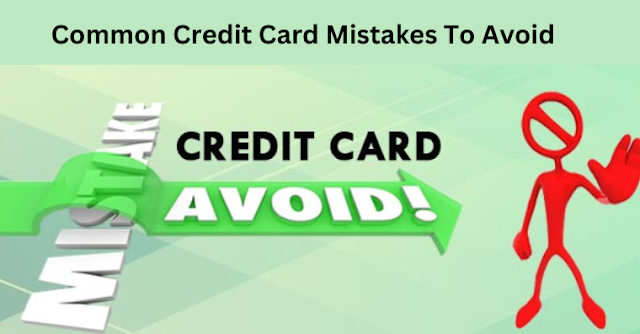Common Credit Card Mistakes To Avoid
A Credit Card is a simple and useful financial tool. When used, they may help clients with establishing credit, financing purchases, and in some situations, earning rewards like miles or cash back. These advantages are attractive but come at a greater price if you’re not aware. Building strong credit, which can enable you to make larger purchases like a home or car, is dependent on using credit cards wisely, carefully, and properly.
Mistakes to Avoid
To get the most out of your credit card, here are five basic credit card mistakes to avoid, along with best practices to follow:
Sending late payments:
The most common credit card error is making late payments. When you are too busy with work or family duties and forget to pay your credit card bills. And the main factor affecting your credit score is your payment history. Missed payments will result in penalty fees and if you don’t pay off your debt, then you have to pay interest on it for a longer period.
Making a late payment can lower your credit score and can remain on your credit record for up to seven years, which makes the situation worse. This problem can be resolved by setting up autopay on your credit card, registering for alerts, or setting up calendar reminders.
Using the majority of your credit limit:
Your credit health is influenced by your credit usage, which is also known as the ”amount owing” on your credit report. This figure illustrates how much credit you’re utilizing and dividing your all balances by your entire credit limit to calculate the ratio. Consider that you have three credit cards. Credit card No. 1 has Rs. 10,000 limit, Credit card No. 2 has Rs. 40,000 limit, and Credit card No. 3 has Rs. 5,00,000 limit. You have a total of Rs. 5,50,000 in credit available.
If you have a balance of Rs. 2,500 on credit card 1, Rs. 20,000 on credit card 2, and Rs. 1,77,500 on credit card 3, you’re utilizing Rs. 2,00,000 of your total limit.
Using the credit utilization ratio for calculation which divides balances by the credit limit, you would divide Rs. 2,00,000 by Rs. 5,50,000.
2,00,000/5,50,000 = 0.36
Multiplying 0.36 by 100 is 36% and this is your credit utilization ratio which is more than what is suggested. Although it’s generally advised to maintain your credit utilization ratio around 30%, whereas, some financial experts advise lowering it to 10% or even lower.
Using a Credit Card for Daily Purchases.
When you overuse your credit card, then it becomes simple to increase debt. Generally speaking, you should avoid using your card for everyday expenditures like food, furniture, and apparel. For reasonable purchases that should be covered by your household’s monthly budget, paying with a credit card can be subject to additional interest charges. In simple words, using credit cards may increase the cost of a gallon of milk, a carton of eggs, and a package of paper towels compared to using cash only.
Closing your Credit Card:
Similar to accepting new credit card offers, closing credit cards requires good judgment and a thorough knowledge of the advantages and disadvantages. Even though canceling an inactive credit card account won’t necessarily lower your credit score, it might have a little negative impact. This is because when a credit card is closed its credit limit is subtracted from your total credit limit. If there are any outstanding balances on your credit report, then this will increase your total credit utilization rate and reduce your credit score.
Conclusion
If you use credit cards correctly, you may save a lot of money, but making any of the above-mentioned credit card mistakes may hesitate you to use a credit card in the future. Therefore, you must be careful to avoid making mistakes that lower your credit score and instead do everything you can to develop a good credit profile.
Additional Reading: Calculation Of CIBIL Score: How Is The CIBIL Score Determined?




Comments
Post a Comment